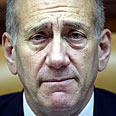
Majority of ministers to vote in favor of prisoner swap with Hizbullah
Sunday marks zero hour in detrmining fate of MIAs Regev, Goldwasser. Ministers to be briefed on swap details, followed by PM Olmert's statement, cabinet vote. Minister Avraham: Price is painful, but it will not be an obstacle to returning soldiers
Nearly two years after they were kidnapped to Lebanon, the Israeli government is expected to approve Sunday the exchange deal with Hizbullah for the return of IDF captives Ehud Goldwasser and Eldad Regev.
In a poll conducted by Ynet, 18 out of 25 cabinet members said they would vote in favor of the deal to return Goldwasser and Regev in exchange for terrorist Samir Kuntar, four Hizbullah members imprisoned in Israel and the remains of additional members.
Contrary to previous reports, Prime Minister Ehud Olmert intends to bring the deal with Hizbullah for a vote during the cabinet meeting. Olmert’s office refused to report his stance, explaining that he will be presenting it before the ministers.
Although no minister has declared his or her support of the deal, it seems that a majority will be voting in its favor. Five of the ministers are still debating the issue or waiting to hear more information before making their decision. Foreign Minister Tzipi Livni and Finance Minister Ronnie Bar-On have yet to disclose their positions.
According to Ynet’s poll, all Labor Party ministers are in favor of the deal, namely Defense Minister Ehud Barak, Infrastructure Minister Binyamin Ben-Eliezer, Agriculture Minister Shalom Simhon, Social Affairs Minister Isaac Herzog, Education Minister Yuli Tamir, Minister Without Portfolio Ami Ayalon and Minister of Science Culture and Sport Raleb Majadale.
Kadima Party ministers announcing their support of the deal include Vice Premier Haim Ramon, Minister of Environmental Protection Gideon Ezra, Minister Without Portfolio Ruhama Avraham-Balila, Minister of Internal Affairs Meir Shitrit and Internal Security Minister Avi Dichter.
Two other Pensioners’ Party ministers supporting the deal are Rafi Eitan and Yacov Ben-Yizri. The four Kadima ministers still having second thoughts are Transportation Minister Shaul Mofaz, Minister of Housing and Construction Ze’ev Boim, Justice Minister Daniel Friedmann and Minister of Immigrant Absorption Jacob Edery.
‘Price is painful, but not an obstacle’
The four Shas ministers - Minister of Industry, Trade, and Labor Eli Yishai, Minister of Religious Services Yitzhak Cohen, Communications Minister Ariel Atias and Minister Without Portfolio Meshulam Nahari -back the deal, this after their party's spiritual leader, Rabbi Ovadia Yosef, gave his consent.
Defense Minister Barak, who will most likely vote in favor of the deal, told Admiral Michael Mullen, chairman of the US Joint Chiefs of Staff during their Saturday meeting that “as a soldier, former commander and defense minister I say that we have moral obligation to bring the soldiers back home, dead or alive.”
Minister Ruhama Avraham-Balila told Ynet: “The price is painful and unbearable, but it will not be an obstacle to returning the soldiers.”
Shas Chairman Yishai told Ynet that “the Israeli government is responsible to end the anguish of the kidnapped soldiers’ families. Moreover, Jewish Law places great emphasis on releasing a woman from the status of being abandoned, and Rabbi Ovadia Yosef, holding this matter of chief concern, instructed Shas' ministers to vote favorably.”
Ministers to be briefed on details of swap deal
The cabinet’s weekly meeting Sunday, which will be extended due to the discussion and vote on the prisoner exchange deal, will be attended by a number security establishment heads, including Mossad Chief Meir Dagan, Shin Bet head Yuval Diskin, IDF Chief of Staff Lt.-Gen. Gabi Ashkenazi and intelligence officials.
Ofer Dekel, the Prime Minister's Office's emissary heading Israel's efforts to have its missing and captive soldiers' returned and Ilan Biran, formerly representing Israel on the negotiations to return missing navigator Ron Arad, are also expected to attend.
The ministers will be briefed on the impending deal with Hizbullah, after which they will state their opinions, while the prime minister will conclude the meeting and carry out the voting. The ministers will be presented with two tough calls: One is giving up Israel’s last bargaining chip in the Ron Arad case – terrorist Samir Kuntar.
The second is Hizbullah’s demand to have Israel release hundreds of Palestinian prisoners, despite Israel’s intention of only releasing a few of them as a gesture to Palestinian President Mahmoud Abbas and UN Secretary-General Ban Ki-moon.
Estimates indicate that despite these hurdles, the Israeli cabinet will vote in favor of the deal. Once the deal is approved, Dekel will submit Israel’s decision via German mediator Gerhard Konrad. If Hizbullah approves the deal, its execution phase will follow.










